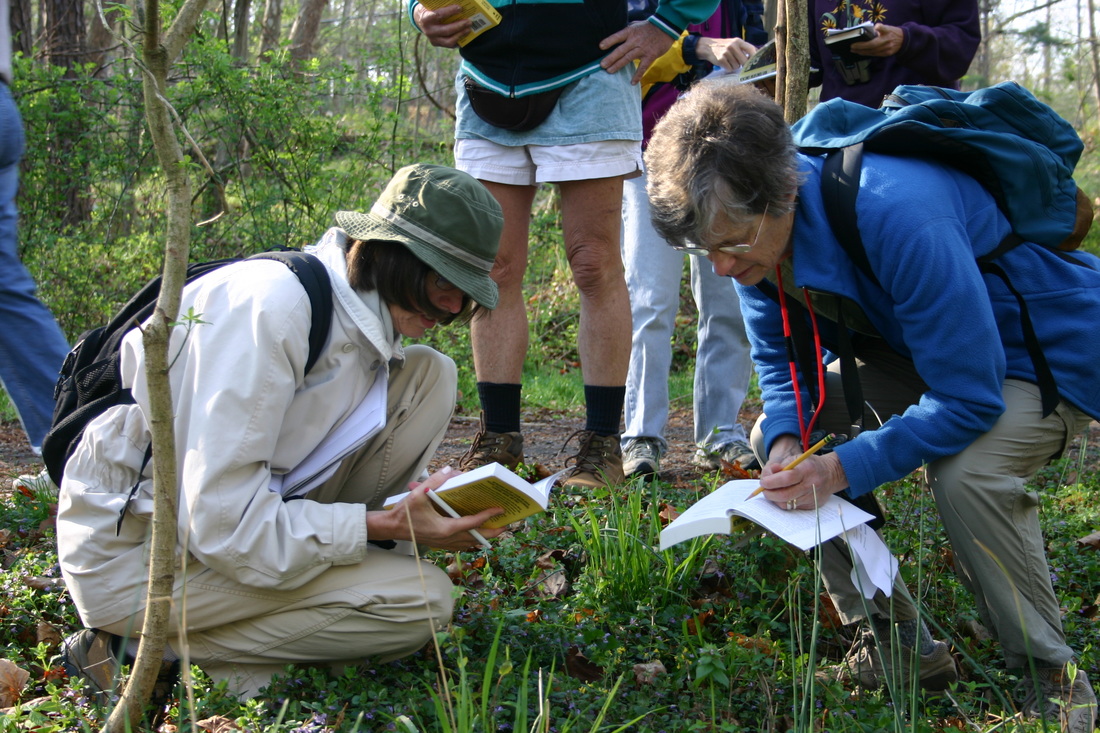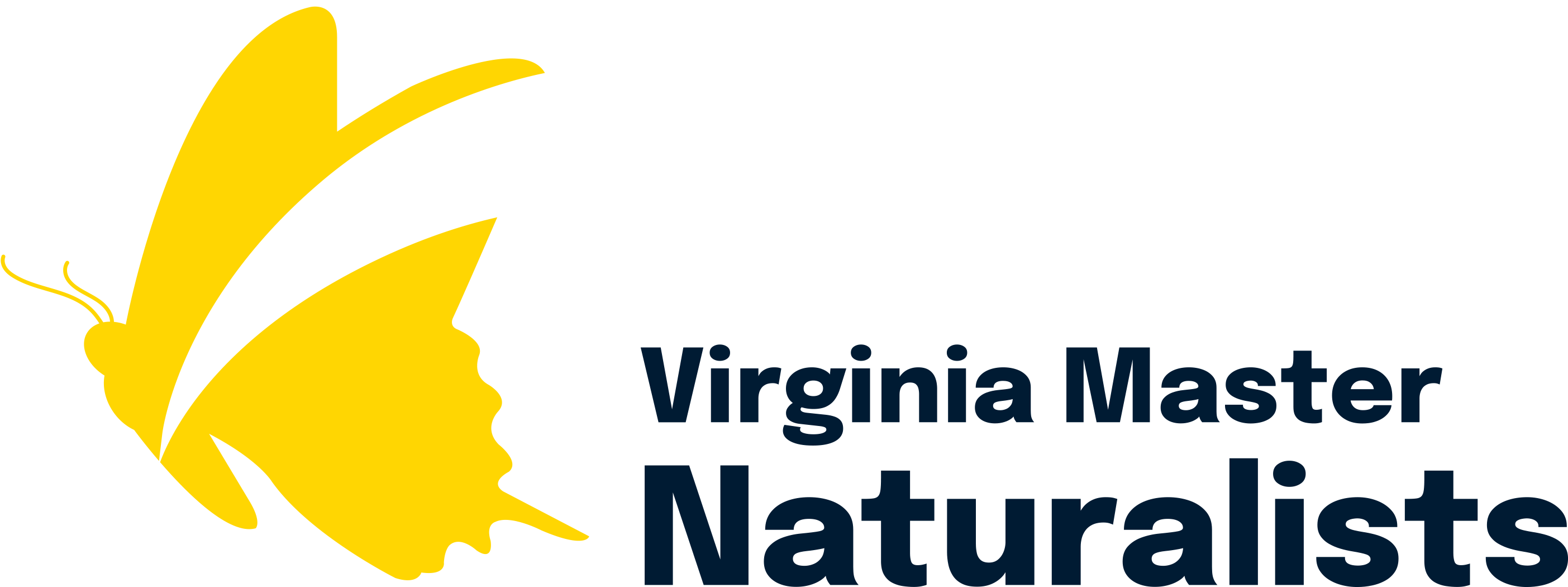 VMN volunteers from the Rivanna Chapter identify wildflowers on a field trip.
VMN volunteers from the Rivanna Chapter identify wildflowers on a field trip.
Project Overview
Project RareQuest is a pilot project to involve trained Virginia Master Naturalist volunteers in monitoring occurrences of rare species of plants and animals, many of which have not been seen in many years. It is a partnership with the Virginia Department of Conservation and Recreation’s Natural Heritage Program, and it is funded in part by the Virginia Native Plant Society.
Project Purpose
VDCR has a database of more than 9,000 occurrences of rare species across the Commonwealth. They are called EOs (element occurrences) and include plants as well as animals. These EOs need to be monitored on a regular basis to check on their status. With so many sites and occurrences, VDCR can really use the help of talented Virginia Master Naturalists to get the job done.
How It Works
Participating volunteers will receive training, either in-person or online, on the project. Next, they will be assigned particular EOs in their region to monitor. Most sites are on private land, so part of the project involves contacting the landowners ahead of time to request permission to visit the sites. Volunteers will only need to visit each site once, find the species (if it is present), and document a few basic characteristics of the site and population. Data will be collected by VDCR using an online application.
Sign-Ups
- If, after reading through this entire project description, you are interested and qualified to serve in one or more of the volunteer roles, we ask that you complete the signup survey available at http://bit.ly/1JAw8Bx no later than Wednesday, June 24.
- We will use this survey to get volunteers matched with one of the training options (see below), to group volunteers into teams so that all the volunteer roles are covered, and to assign volunteers to sites and occurrences to monitor.
- If we have more volunteers than we are able to accommodate this year, we will make assignments based on interest in the various volunteer roles, geographic location, and skill levels.
Why Participate
- Participating volunteers will have the opportunity to visit sites not normally accessible and see rare species.
- They will be recognized in newsletter articles and scientific reports relating to the project.
Training
We will have two training options for this project.
Training Option 1: VMN Regional Conferences (cost = approximately $50, which includes the entire day of workshops and sessions as well as lunch)
- We will offer a 2.5 hour training for this project at each of the VMN regional conferences.
- Chris Ludwig (VDCR) and Tom Smith (VDCR) will go over the volunteer roles, provide training in the data collection app, and lead a practice session with the volunteer protocols.
- We have space for 25 volunteers in each session, and we highly encourage volunteers who are qualified for and interested in one or more of the volunteer roles below to attend.
- If you complete the sign-up survey (see Sign-Ups, above) and are chosen to participate in this project, then we will contact you with additional information on how to register for the VMN Regional Conference in general and this session specifically.
- Information on the dates and locations for the regional conferences and on which chapters are contained in each region is at http://www.virginiamasternaturalist.org/home/dates-and-venues-of-regional-conferences-announced.
Training Option 2: Webinar (cost = free)
- We will offer a series of 2 or 3 webinars that cover similar material as the in-person training, minus the hands-on practice. These will take place during Fall 2015, and they will be recorded so that volunteers may participate live or watch them later.
Volunteer Roles
Please note that a single person could serve in multiple volunteer roles. This list covers all the five functions that must be completed for the project to be successful.
Plant Identifier
Duties
- Using the maps and information provided by VDCR and following provided protocols, visit known species occurrence locations, look for the target species and populations, and document presence/absence and health of the population.
Skills Needed
- Basic pl
ant identification skills. As a test of basic botanical skills, the Plant Identifiers should be able to answer the following questions:
- What are the two most common types of Lady’s Slippers found in Virginia, and what are two ways you can tell the two species apart?
- Name five Virginia maple species including the one with divided leaves.
- Name a plant of the Virginia mountains and one from the Coastal Plain.
- Ability to read a map and use it to navigate to a specific location.
Bird Identifier
Duties
- Using the maps and information provided by VDCR and following provided protocols, visit known species occurrence locations, look for the target species and populations, and document presence/absence and health of the population.
Skills Needed
- Bird Identifiers do not need to be expert birders, but they should have basic skills. As a test of basic birding skills, the Bird Identifiers should be able to answer the following questions:
- What are the differences between the Northern Loggerhead Shrike and the Northern Mockingbird?
- Where would you look for a breeding Morning Warbler in Virginia?
- Name 6 woodpeckers of Virginia.
- Ability to read a map and use it to navigate to a specific location
Butterfly Identifier
Duties
- Using the maps and information provided by VDCR and following provided protocols, visit known species occurrence locations, look for the target species and populations, and document presence/absence and health of the population.
Skills Needed
- Butterfly Identifiers do not need to be experts, but they should have basic skills. As a test of basic butterfly identification skills, the Butterfly Identifiers should be able to answer the following questions:
- How do you distinguish the Black, Pipevine, and the black form of the Eastern Tiger swallowtail from each other?
- Name one of Virginia’s adult-overwintering butterflies.
- How can you tell a butterfly from a moth?
Data Wrangler
Duties
- Using the software provided by VDCR and following provided protocols, upload data on occurrences. Ideally, this is done in the field using a smart phone or tablet with cellular service, but it can be done after the field visit using a computer.
Skills Needed
- Data Wrangler volunteers should be comfortable with computers and mobile applications, and they should feel confident about learning new software and apps.
Landowner Liaison
Duties
- Using the landowner information provided by VDCR and following provided protocols, contact the landowner to request permission for the volunteer team to visit the site. Follow up with the landowner to let him/her know the status of the occurrences.
Skills Needed
- Landowner Liaisons should be good communicators, confident about making phone calls to people they haven’t met, and good at making people around them feel comfortable.
